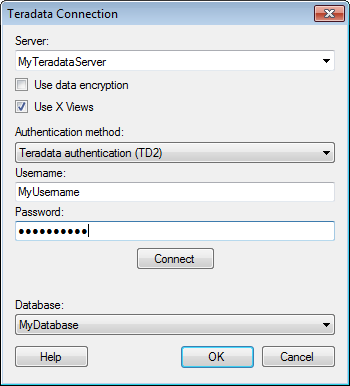
This dialog is used to set up a connection to a Teradata database,allowing you to choose whether to analyze data in-database or to import it into your analysis. Note that you need to install a driver on your computer to get access to the Teradata connector. See the system requirements at http://support.spotfire.com/sr_spotfire_dataconnectors.asp to find the correct driver. You can also view Getting Started with Connectors to learn more about getting access to connectors in Spotfire.
To add a new Teradata connection to the library:
Select Tools > Manage Data Connections.
Click Add New > Data Connection and select Teradata.
To add a new Teradata connection to an analysis:
Select File > Add Data Tables....
Click Add.
Select Connection To > Teradata.

Option |
Description |
Server |
The name of the server where your data is located. To include a port number, add it directly after the server name preceded by colon. Example with port number: |
Use
data encryption |
Select this check box to use data encryption when connecting to the database. |
Use
X Views |
Select this check box to use X Views. X Views limits a user's view to only those objects that the user has permission to access. |
Authentication
method |
The authentication method to use when logging into the database. Choose from Teradata authentication (TD2), LDAP authentication and Windows authentication. Teradata authentication (TD2) With database authentication the authentication is done using a database user. Database credentials can be stored, unencrypted, as part of the analysis file, using a setting in the Data Source Settings dialog. If credentials are found in the analysis file they will be used to automatically authenticate against the database. If no credentials or credentials profiles are found in the analysis file all who open the file will be prompted for database credentials. Note that there will be no prompting for credentials if the credentials embedded in the analysis file fail. LDAP authentication When using LDAP authentication, users are prompted to enter their LDAP credentials. Users with valid accounts in the LDAP directory will be able to connect and read data. Windows authentication When using Windows Authentication, e.g., Kerberos, the access token of the logged in user will be used. Users that have been given the appropriate access rights to Teradata will be able to connect and read data. Domain credentials are not stored in the analysis file. |
Username |
The username you wish to use when logging into the Teradata database. |
Password |
The password for the specified username. |
Connect |
Connects you to the specified server and populates the list of available databases below. |
Database |
Select the database of interest from the drop-down list. |
See also: